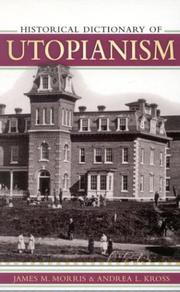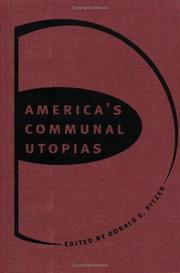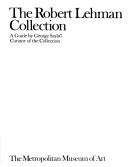| Listing 1 - 9 of 9 |
Sort by
|

ISBN: 0810849127 Year: 2004 Volume: 51
Abstract | Keywords | Export | Availability | Bookmark
 Loading...
Loading...Choose an application
- Reference Manager
- EndNote
- RefWorks (Direct export to RefWorks)
Utopias --- Utopies --- History --- Dictionaries. --- Histoire --- Dictionnaires anglais --- Dictionaries --- Utopianism --- utopian thought --- Thomas More --- the Shakers --- Oneida --- Robert Owen --- the Fourierists
Digital
Abstract | Keywords | Export | Availability | Bookmark
 Loading...
Loading...Choose an application
- Reference Manager
- EndNote
- RefWorks (Direct export to RefWorks)
Book
ISBN: 2804800024 9782804800024 Year: 2004 Volume: *18 Publisher: Bruxelles Complexe
Abstract | Keywords | Export | Availability | Bookmark
 Loading...
Loading...Choose an application
- Reference Manager
- EndNote
- RefWorks (Direct export to RefWorks)
Guerre mondiale II ; France --- Paxton, Robert Owen --- Wereldoorlog II ; Frankrijk --- World War, 1939-1945 --- 2ème guerre mondiale --- Historiography --- Historiographie --- Paxton, Robert O. --- France --- History --- Social conditions --- Histoire --- Conditions sociales --- Collaborationists --- Historians --- Attitudes --- 2ème guerre mondiale --- Historiography. --- Collaborationists - France - Historiography --- Historians - France - Attitudes --- FRANCE --- PAXTON, ROBERT OWEN (1932-...) --- HISTOIRE --- 1940-1945 (OCCUPATION ALLEMANDE) --- CRITIQUE ET INTERPRETATION
Book
ISBN: 9780691172903 0691172900 0691180814 9780691180816 Year: 2018 Publisher: Princeton (N.J.) : Princeton University Press,
Abstract | Keywords | Export | Availability | Bookmark
 Loading...
Loading...Choose an application
- Reference Manager
- EndNote
- RefWorks (Direct export to RefWorks)
"William Roberts argues that Capital was primarily a careful engagement with the motives and aims of the workers' movement. Understood in this light, Capital emerges as a profound work of political theory. Placing Marx against the background of nineteenth-century socialism, Roberts shows how Capital was ingeniously modeled on Dante's Inferno, and how Marx, playing the role of Virgil for the proletariat, introduced partisans of workers' emancipation to the secret depths of the modern 'social Hell.' In this manner, Marx revised republican ideas of freedom in response to the rise of capitalism. Combining research on Marx's interlocutors, textual scholarship, and forays into recent debates, Roberts traces the continuities linking Marx's theory of capitalism to the tradition of republican political thought. He immerses the reader in socialist debates about the nature of commerce, the experience of labor, the power of bosses and managers, and the possibilities of political organization. Roberts rescues those debates from the past, and shows how they speak to ever-renewed concerns about political life in today's world"
Capitalism --- Politische Theorie. --- Political aspects. --- Dante Alighieri, --- Marx, Karl, --- Inferno (Dante Alighieri). --- Kapital (Marx, Karl). --- Capital. --- Charles Fourier. --- Dante. --- G. A. Cohen. --- Inferno. --- Karl Marx. --- Owenism. --- Pierre-Joseph Proudhon. --- Robert Owen. --- Saint-Simonians. --- akrasia. --- anarchy. --- association. --- capital accumulation. --- capitalism. --- capitalist exploitation. --- capitalist mode of production. --- collective force. --- commerce. --- domination. --- expropriation. --- force. --- fraud. --- labor power. --- labor. --- market society. --- money. --- overwork. --- political economy. --- political theory. --- primitive accumulation. --- republicanism. --- separatism. --- social Hell. --- socialism. --- surplus labor. --- treachery. --- wages. --- workers' movement. --- working class.
Book
ISBN: 9781400883707 1400883709 0691172900 9780691172903 9780691180816 0691180814 Year: 2017 Publisher: Princeton
Abstract | Keywords | Export | Availability | Bookmark
 Loading...
Loading...Choose an application
- Reference Manager
- EndNote
- RefWorks (Direct export to RefWorks)
Marx's Inferno reconstructs the major arguments of Karl Marx's Capital and inaugurates a completely new reading of a seminal classic. Rather than simply a critique of classical political economy, William Roberts argues that Capital was primarily a careful engagement with the motives and aims of the workers' movement. Understood in this light, Capital emerges as a profound work of political theory. Placing Marx against the background of nineteenth-century socialism, Roberts shows how Capital was ingeniously modeled on Dante's Inferno, and how Marx, playing the role of Virgil for the proletariat, introduced partisans of workers' emancipation to the secret depths of the modern "social Hell." In this manner, Marx revised republican ideas of freedom in response to the rise of capitalism.Combining research on Marx's interlocutors, textual scholarship, and forays into recent debates, Roberts traces the continuities linking Marx's theory of capitalism to the tradition of republican political thought. He immerses the reader in socialist debates about the nature of commerce, the experience of labor, the power of bosses and managers, and the possibilities of political organization. Roberts rescues those debates from the past, and shows how they speak to ever-renewed concerns about political life in today's world.
Capitalism --- Political aspects. --- Dante Alighieri, --- Marx, Karl, --- Capital. --- Charles Fourier. --- Dante. --- G. A. Cohen. --- Inferno. --- Karl Marx. --- Owenism. --- Pierre-Joseph Proudhon. --- Robert Owen. --- Saint-Simonians. --- akrasia. --- anarchy. --- association. --- capital accumulation. --- capitalism. --- capitalist exploitation. --- capitalist mode of production. --- collective force. --- commerce. --- domination. --- expropriation. --- force. --- fraud. --- labor power. --- labor. --- market society. --- money. --- overwork. --- political economy. --- political theory. --- primitive accumulation. --- republicanism. --- separatism. --- social Hell. --- socialism. --- surplus labor. --- treachery. --- wages. --- workers' movement. --- working class.

ISBN: 080789897X 9780807898970 9781469604459 1469604450 080782299X 9780807822999 0807846090 9780807846094 Year: 1997 Publisher: Chapel Hill : The University of North Carolina Press,
Abstract | Keywords | Export | Availability | Bookmark
 Loading...
Loading...Choose an application
- Reference Manager
- EndNote
- RefWorks (Direct export to RefWorks)
From the Shakers to the Branch Davidians, America's communal utopians have captured the popular imagination. Seventeen original essays here demonstrate the relevance of such groups to the mainstream of American social, religious, and economic life. The contributors examine the beliefs and practices of the most prominent utopian communities founded before 1965, including the long-overlooked Catholic monastic communities and Jewish agricultural colonies. Also featured are the Ephrata Baptists, Moravians, Shakers, Harmonists, Hutterites, Inspirationists of Amana, Mormons, Owenites, Fourierists, I
Collective settlements -- United States -- History. --- Communal living -- United States -- History. --- Communitarianism -- United States. --- Communitarianism. --- Collective settlements --- United States --- History --- Communitarianism --- communitarian societies --- Colonial America --- the Shakers --- Mother Ann Lee --- George Rapp --- Harmony Society --- the New Moral World --- Robert Owen --- New Harmony --- communal life --- communal values --- the Mormons --- Brook Farm --- the Fourierist Phalanxes --- Immediatism --- Gradualism --- American Utopian Socialism --- the Community of True Inspiration --- Germany --- the Amana Colonies --- religious orders --- monastic communalism --- America --- Free Love --- John Humphrey Noyes --- the Oneida Perfectionists --- the Icarian communities --- Eric Jansson --- the Bishop Hill Colony --- Hutterism --- American Jewish agricultural colonies --- Cyrus Reed Teed --- the Koreshan Unity --- the Theosophical Communities --- Universal Brotherhood --- Father Divine --- the Peace Mission
Book
ISBN: 1400884314 Year: 2016 Publisher: Princeton, NJ : Princeton University Press,
Abstract | Keywords | Export | Availability | Bookmark
 Loading...
Loading...Choose an application
- Reference Manager
- EndNote
- RefWorks (Direct export to RefWorks)
The vision of Utopia obsessed the nineteenth-century mind, shaping art, literature, and especially town planning. In City of Refuge, Michael Lewis takes readers across centuries and continents to show how Utopian town planning produced a distinctive type of settlement characterized by its square plan, collective ownership of properties, and communal dormitories. Some of these settlements were sanctuaries from religious persecution, like those of the German Rappites, French Huguenots, and American Shakers, while others were sanctuaries from the Industrial Revolution, like those imagined by Charles Fourier, Robert Owen, and other Utopian visionaries.Because of their differences in ideology and theology, these settlements have traditionally been viewed separately, but Lewis shows how they are part of a continuous intellectual tradition that stretches from the early Protestant Reformation into modern times. Through close readings of architectural plans and archival documents, many previously unpublished, he shows the network of connections between these seemingly disparate Utopian settlements-including even such well-known town plans as those of New Haven and Philadelphia.The most remarkable aspect of the city of refuge is the inventive way it fused its eclectic sources, ranging from the encampments of the ancient Israelites as described in the Bible to the detailed social program of Thomas More's Utopia to modern thought about education, science, and technology. Delving into the historical evolution and antecedents of Utopian towns and cities, City of Refuge alters notions of what a Utopian community can and should be.
Utopias. --- City planning --- City planning --- Collective settlements. --- Social aspects. --- Religious aspects. --- Bible. --- Black Forest. --- Count Nicholas Zinzendorf. --- Duke of Wrttemberg. --- Economy. --- Freudenstadt. --- Friedrich I. --- GermanЁmerican architecture. --- Harmonists. --- Heinrich Schickhardt. --- Herrnhaag. --- Industrial Revolution. --- Johann Georg Rapp. --- Moravian Church. --- New Harmony. --- New Jerusalem. --- Pennsylvania. --- Protestants. --- Robert Owen. --- Thomas More. --- Unity of the Brethren. --- Utopia. --- Utopian community. --- Utopian town planning. --- Western world. --- city of joy. --- city of refuge. --- collective ownership. --- communal dormitory. --- ideal society. --- industrial capitalism. --- model city. --- modernity. --- physical isolation. --- refugee settlement. --- religions refugees. --- religious expression. --- religious refugees. --- sanctuary. --- settlement. --- social cohesion. --- social homogeneity. --- socialism. --- squareness. --- town planning.
Book
ISBN: 140088960X 9781400889600 9780691154169 0691154163 Year: 2018 Publisher: Princeton
Abstract | Keywords | Export | Availability | Bookmark
 Loading...
Loading...Choose an application
- Reference Manager
- EndNote
- RefWorks (Direct export to RefWorks)
The entertaining story of four utopian writers-Edward Bellamy, William Morris, Edward Carpenter, and Charlotte Perkins Gilman-and their continuing influence todayFor readers reared on the dystopian visions of Nineteen Eighty-Four and The Handmaid's Tale, the idea of a perfect society may sound more sinister than enticing. In this lively literary history of a time before "Orwellian" entered the cultural lexicon, Michael Robertson reintroduces us to a vital strain of utopianism that seized the imaginations of late nineteenth-century American and British writers.The Last Utopians delves into the biographies of four key figures--Edward Bellamy, William Morris, Edward Carpenter, and Charlotte Perkins Gilman-who lived during an extraordinary period of literary and social experimentation. The publication of Bellamy's Looking Backward in 1888 opened the floodgates of an unprecedented wave of utopian writing. Morris, the Arts and Crafts pioneer, was a committed socialist whose News from Nowhere envisions a workers' Arcadia. Carpenter boldly argued that homosexuals constitute a utopian vanguard. Gilman, a women's rights activist and the author of "The Yellow Wallpaper," wrote numerous utopian fictions, including Herland, a visionary tale of an all-female society.These writers, Robertson shows, shared a belief in radical equality, imagining an end to class and gender hierarchies and envisioning new forms of familial and romantic relationships. They held liberal religious beliefs about a universal spirit uniting humanity. They believed in social transformation through nonviolent means and were committed to living a simple life rooted in a restored natural world. And their legacy remains with us today, as Robertson describes in entertaining firsthand accounts of contemporary utopianism, ranging from Occupy Wall Street to a Radical Faerie retreat.
Utopias in literature. --- LITERARY CRITICISM / Modern / General . --- Utopian literature --- Bellamy, Edward, --- Morris, William, --- Carpenter, Edward, --- Gilman, Charlotte Perkins, --- Criticism and interpretation. --- Moris, V., --- Morisu, Wiriamu, --- Morris, Uilʹi͡am, --- Morris, William M., --- Gilman, Charlotte Perkins Stetson, --- Perkins, Charlotte Anna, --- Stetson, Charles Walter, --- Stetson, Charlotte Perkins, --- Karpenter, Ėduard, --- Bellamy, Edvard, --- Beramī, Edowādo, --- Morris, Uilʹi︠a︡m, --- Морис, В., --- Bellamy, Edward --- Bellamy, Edvard --- Beramī, Edowādo --- בעלאמי, ע. --- בעללאמי, א. --- Charles Fourier. --- Charlotte Perkins Gilman. --- Edward Bellamy. --- Edward Carpenter. --- Equality. --- Henri de Saint-Simon. --- Henry George. --- Herland. --- John Ruskin. --- Looking Backward. --- Nationalism. --- News from Nowhere. --- Progress and Poverty. --- Radical Faeries. --- Robert Owen. --- The Nature of Gothic. --- Thomas More. --- Towards Democracy. --- Uranians. --- Urning. --- Utopia. --- Walt Whitman. --- William Morris. --- World's Mother. --- community. --- economic equality. --- education. --- egalitarianism. --- everyday utopias. --- homogenic love. --- homosexuality. --- industrial capitalism. --- intermediate sex. --- labor. --- last utopians. --- literary dystopia. --- motherhood. --- mothers. --- progress. --- radical equality. --- religion. --- social thought. --- social transformation. --- socialism. --- sustainability. --- technology. --- transatlantic utopianism. --- universal spirit. --- utopia. --- utopian literature. --- utopianism. --- women.

ISBN: 0870991272 9780870991271 Year: 1975 Publisher: New York Metropolitan museum of art
Abstract | Keywords | Export | Availability | Bookmark
 Loading...
Loading...Choose an application
- Reference Manager
- EndNote
- RefWorks (Direct export to RefWorks)
Lehman, Robert --- Art collections --- Catalogs --- Art --- Private collections --- New York (N.Y.) --- Metropolitan Museum of Art (New York, N.Y.) --- Art - Private collections - New York (State) - New York - Catalogs --- Lehman, Robert, - 1892-1969 - Art collections --- Catalogs. --- Collections privées --- Catalogues --- Lehman, Robert, --- Art collections. --- Art, Occidental --- Art, Primitive --- Art, Visual --- Art, Western (Western countries) --- Arts, Fine --- Arts, Visual --- Fine arts --- Iconography --- Occidental art --- Visual arts --- Western art (Western countries) --- Arts --- Aesthetics --- Lehman, Robert Owen, --- Lehman, R. O., --- Museo Metropolitano de Arte de Nueva York --- Muzeĭ Metropoliten (New York, N.Y.) --- New York (City). --- New York (N.Y.). --- Khudozhestvennyĭ muzeĭ Metropoliten (New York, N.Y.) --- Metropolitan Museum of Arts di New York --- Metoroporitan Bijutsukan (New York, N.Y.) --- MMA --- Miguk Met'ŭrop'ollit'an Misulgwan --- 미국 메트로 폴리탄 미술관 --- Lehman, Robert, - 1892-1969 --- The Met
| Listing 1 - 9 of 9 |
Sort by
|

 Search
Search Feedback
Feedback About
About Help
Help News
News